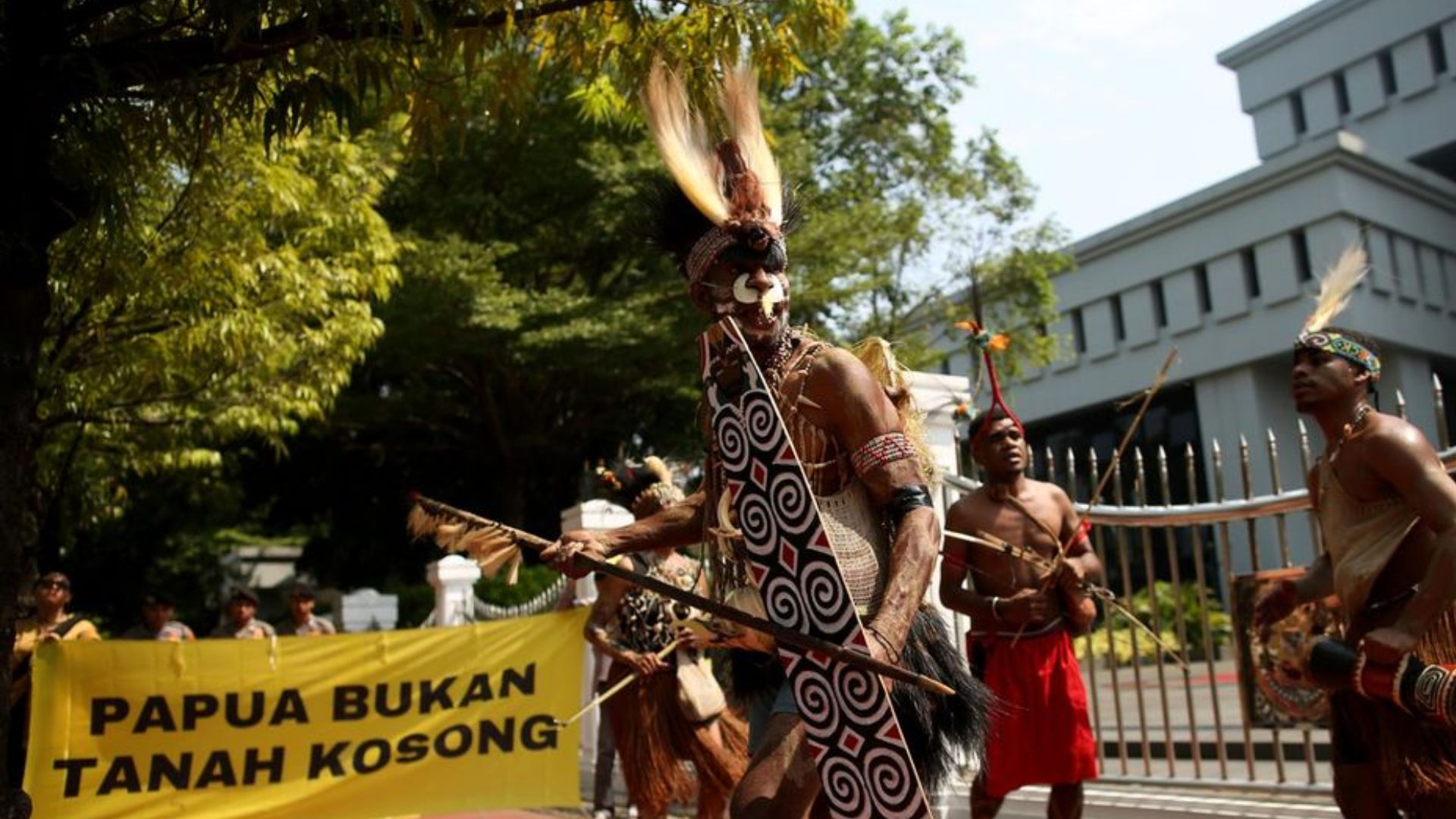We, the undersigned organisations, express our solidarity with the Awyu and Moi communities from the Boven Digoel and Sorong districts of West Papua, who are peacefully striving to protect their indigenous land and way of life from destructive palm oil plantations.
Indonesia is the largest producer of palm oil in the world. The Indonesian Government has a notorious history of ignoring human rights and environmental rights in its palm oil plantations.
Over the years, the government has been involved in illegal deforestation and the seizure and destruction of land without free, prior and informed consent (FPIC) or meaningful consultations with communities.
Reports have also highlighted complicity from big corporations like Unilever, Nestle, PepsiCo, and Cargill that buy palm oil from suppliers with a dismal human rights track record.
The rights of Indigenous Peoples
The recent efforts of the Awyu and Moi communities, urging the Supreme Court to revoke permits for four palm oil companies, is just another example of the struggles that those opposing palm oil plantations have to face.
In 2023, the Jayapura State Administrative Court rejected the lawsuit initiated by the indigenous Awyu community and upheld the permit for palm oil company PT Indo Asiana Lestari (PT IAL) to continue with a palm oil plantation covering a forested area of 39,190 hectares of indigenous land.
Additionally, the Awyu community is fighting two other lawsuits related to two more palm oil companies—PT Kartika Cipta Pratama and PT Megakarya Jaya Raya—that have appealed against a decision by the Minister of Environment and Forestry to cancel permits issued over indigenous land.
The fourth lawsuit was initiated by members of the Moi community, who are fighting to protect 18,160 hectares of customary forest in Sorong district. After an initial win—where PT Sorong Agro Sawitindo’s permits were revoked—the company challenged the revocation in the Jakarta Administrative Court. Subsequently, when the court ruled in favour of the palm oil company, members of the Moi community filed an appeal to the Supreme Court in May 2024.
On 10 June, the police violently disrupted a peaceful solidarity gathering by a group of university students in Denpasar, Bali who are part of the University Students and Papuan Community Association (Ikatan Mahasiswa dan Masyarakat Papua-IMMAPA). The police shot teargas and water cannons at students expressing solidarity with the demands of Awyu and Moi communities. Four people, including a legal aid representative, were arrested while multiple protestors were injured and had trouble breathing due to the tear gas.
Despite repeated threats, harassment and abuse, communities and human rights defenders continue to fight with incredible resilience, refusing to accept the government’s inaction.
The violations of the rights of affected people are in direct contrast to national legislation. The Constitution of Indonesia explicitly recognises the rights of Indigenous Peoples.
In 2013, the Indonesian Constitutional Court granted indigenous communities formal rights to their forest, which were previously classified as state owned.
In 2016, the Indonesian Government made the historic move of returning customary forest land to indigenous peoples. However, hope has been short-lived, with the government continuing to greenlight palm oil plantation projects without due consideration of its impact on surrounding communities.
Additionally, the ratification of the Presidential Regulation No. 60 Year 2023 made Indonesia the eighth country in Asia to adopt a National Action Plan (NAP) on Business and Human Rights (Strategi Nasional Bisnis dan Hak Asasi Manusia). The NAP specifically mentions the importance of integrating human rights principles in business operations and creating robust mechanisms for effective grievance redressal.
At the international level, The Committee on Economic, Social, and Cultural Rights (CESCR) recently concluded its review on Indonesia in March 2024. In its recommendations, the Committee stressed the importance of engaging with Indigenous Peoples on issues that affect their rights and ensuring that licences for development projects and business activities are only granted after mandatory human rights due diligence is undertaken and FPIC is obtained.
The cases above represent an increasing trend of disrespect and apathy towards human rights defenders and vulnerable communities when they interfere with the government’s and business’s bottom line, increasing economic growth, and profits.
The struggles of Indigenous Peoples reflect a broader struggle, one which continues to challenge the idea of “development” which requires sacrifice from the most marginalised sections of society.
Call to action
We call on the Government of Indonesia to respect the rights of Indigenous Peoples, as enshrined in Article 18B of the Constitution of the Republic of Indonesia.
Furthermore, we urge the Government of Indonesia to adhere to the principles of FPIC and communities’ right to say no by meaningfully engaging with them before projects are approved. Through independent and comprehensive environmental and social impact assessments, projects that have the potential to create irreversible harm must be immediately denied.
We emphasise the need for multinational companies, global financial institutions, and investors to adhere to the National Action Plan on Business and Human Rights, the United Nations Guiding Principles on Business and Human Rights and the United Nations Declaration on the Rights of Indigenous Peoples.
Stakeholders must adopt a zero tolerance policy and undertake mandatory human rights due diligence throughout the supply chain to hold suppliers and clients accountable for rights violations.
Lastly, we remind the global community of the Indigenous Peoples’ deep connection to their homes as custodians of their land, forests, and natural resources as well as keepers of centuries-old customary traditions. Their right to their territories and resources must be respected and protected.
Signatories
- Asian Forum for Human Rights and Development (FORUM-ASIA)
- Alliance of Independent Journalists (AJI)
- Commission for the Disappeared and Victims of Violence (KontraS)
- Human Rights Working Group (HRWG)
- Indonesian Human Rights Monitor (IMPARSIAL)
- Indonesian Legal Aid Foundation (YLBHI)
- Indonesian Legal Aid and Human Rights Association (PBHI)
- Institute for Policy Research and Advocacy (ELSAM)




